 Astrea Bioseparations has a well-established modular program to support customer projects from small to large scales with ligands, adsorbents, and chromatography columns that design purity into each process. Demand for increased productivity in biopharmaceutical manufacturing has placed new pressure on downstream purification operations. For recombinant proteins and monoclonal antibodies (MAbs), such pressure stems from significant gains in upstream productivity, particularly from high titers produced using increasingly efficient cell-culture systems. For viral vectors used in gene and gene-modified cell therapies and viral-vector vaccines, pressure arises from growing demand for complex products that currently are produced at low titers. In this special report, writers from Astrea Bioseparations describe how the company seeks to build “purity by design” into processes for multiple modalities, not only with off-the-shelf purification solutions, but also with customized support for each stage of downstream process development.
Astrea Bioseparations has a well-established modular program to support customer projects from small to large scales with ligands, adsorbents, and chromatography columns that design purity into each process. Demand for increased productivity in biopharmaceutical manufacturing has placed new pressure on downstream purification operations. For recombinant proteins and monoclonal antibodies (MAbs), such pressure stems from significant gains in upstream productivity, particularly from high titers produced using increasingly efficient cell-culture systems. For viral vectors used in gene and gene-modified cell therapies and viral-vector vaccines, pressure arises from growing demand for complex products that currently are produced at low titers. In this special report, writers from Astrea Bioseparations describe how the company seeks to build “purity by design” into processes for multiple modalities, not only with off-the-shelf purification solutions, but also with customized support for each stage of downstream process development.
In the first two sections, senior product managers for research and development and cell and gene therapy applications explore promising developments in purification of viral vectors. The next section offers practical considerations for fast-protein liquid chromatography (FPLC), highlighting the utility of SNAP columns and hardware for such processes. Using case studies from Astrea Bioseparations customers, a customer services field expert chronicles the discovery, preliminary evaluation, and pilot-scale study of synthetic affinity ligands and adsorbents. Acknowledging the economic uncertainties raised by the COVID-19 pandemic, the report concludes with discussion of strategies for achieving supply-chain resilience amid disrupted networks for raw materials used in biopharmaceutical manufacturing.
Fill out the form below to read this special report now.
This report will appear in the January–February 2022 print issue of BPI.
